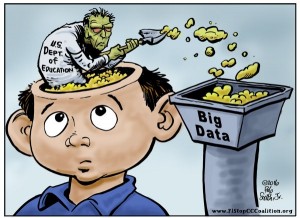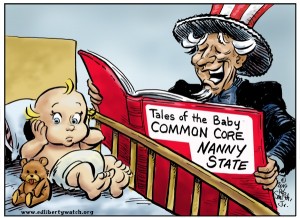The National Pulse – Students’ Privacy Under Serious Threat in Era of School Shootings
This article discusses two federal School Safety Commission meetings dealing with school safety as well as efforts in Florida since the February shooting in Parkland, Florida and how these efforts can and will damage data privacy:
Only one of the three witnesses at the July 11th hearing thought that inappropriate data sharing would hinder students from seeking mental health help. No one discussed the many other dangers of having behavioral and mental health data, especially subjective and often inaccurate screening data collected by minimally trained school personnel reside in longitudinal databases for life. These will be further discussed in a moment.
Another disturbing and related set of developments are the multiple ways that data privacy is being violated in the newly enacted Florida school safety law. These include requiring students to admit any mental health diagnoses, accurate or not, on their beginning-of-year school forms and the new law’s requirement to develop a “centralized integrated data repository and data analytics resource.”
The diagnosis disclosure mandate is a major medical privacy violation, potentially opening students to unwarranted and unwelcome scrutiny by school personnel and law enforcement. Additionally, psychiatric researchers have found that the vast majority (93 percent, according to one study) of the mentally ill will not become violent and that there is no good way to predict which patients will become violent.
The centralized data repository and analytics resource is a euphemism for Big Brother-style monitoring of social media, along with behavioral and mental health data, to allegedly stop threats before they happen. In addition to the grave privacy doubts raised by experts, there is no evidence that this approach even works.
The Miami-Dade school district, neighbor to the Broward district where the Parkland shooting happened, received a $4.6 million grant in 2014 from the U.S. Department of Justice to implement this scheme on a district level. There is now no trace of it on the Miami School Police website. The program ran through the end of 2017 and is being studied by education research company WestEd. Likely possibilities are that the study is not completed yet, the program was a complete failure, or they ran out of money and this new law will be a new funding source. It was extensively described before being taken down
The American Spectator – Will Congress Heed Evidence Government Preschool Is Worthless?
In this article published at The American Spectator, Dr. Effrem and American Principles Project senior fellow, Jane Robbins discuss some of the newest research adding to the veritable mountain of studies showing that government preschool is not helpful and in many cases it can be academically and emotionally harmful:
“Under the most favorable scenario for state pre-K that can be constructed from these data,” the study concluded, “increasing pre-K enrollment by 10 percent would raise a state’s adjusted NAEP scores by a little less than one point five years later and have no influence on the unadjusted NAEP scores.”
For this, we’re spending $7.6 billion?
As Brookings reported, only one existing study conducted randomized trials of a state pre-K program, with follow-up of pre-K participants and non-participants as they progress through elementary school. That study analyzed the Tennessee Voluntary Pre-K Program and produced sobering findings: 1) “fade out” and even reversal of positive achievement effects by grades 2-3, so that pre-K non-participants were outperforming participants; 2) more disciplinary infractions and special-education placements for pre-K participants by grade 3 than for non-participants; and 3) no effect on attendance or retention in later grades. Regarding academic achievement, Brookings’s recent findings align with these.
This dismal report is hardly surprising. The author of the Tennessee study, Dr. Dale Farran, had said in a 2016 Brookings paper that despite 50 years of experience, research does not support the proposition that expanding pre-K will improve later achievement for low-income children.
These papers added to a long list of studies discussed in the Federalist that outlines “government preschool programs’ practically insignificant improvements, fadeout of beneficial effects, their academicand emotional harm… and researchers’ and advocates’ frank agreement with Farran that labeling preschool programs as ‘high quality’ does not correlate with any evidence of improved lives or academic performance, including in studies of Head Start“…
…As evidence mounts against government pre-K, can we expect to see funding dry up? Not likely. The federal government has known about the uselessness of Head Start for literally decades, but has routinely increased spending on that sorry program. For the 2019 budget cycle, both congressional appropriations committees blindly increased Head Start funding by $50-250 million — above the 2018 budget’s absurd $610 million increase.
Remember Head Start and other government pre-K programs when politicians argue for increased collection of sensitive data on citizens, and swapping that data among federal agencies, in the name of building “evidence” to determine “what works.” This is what the bipartisan Foundations for Evidence-Based Policymaking Act will supposedly accomplish. Behold, our cup runneth over with evidence that government preschool is ineffective and harmful. We’ll consider giving the government more data when we have evidence the government will pay any attention to it. In the meantime, parents, keep your kids out of government preschool.
The full article is available here. Please try to mention this study as you talk to various members of Congress and candidates during the mid-term campaign.
The National Pulse – Screen and Medicate More Students? School Safety Commission Gets Wrong Message
This article describes the concerns about inaccurate information presented by witnesses at the July 11th federal School Safety Commission regarding student mental screening and the relationship between psychiatric drug use and mass violence:
If the White House School Safety Commission is to make wise and helpful recommendations to protect school children, it needs to have good information. Sadly, most of the witnesses chosen to discuss the mental health aspects of this complex problem at a commission meeting earlier this month only provided limited and potentially dangerous recommendations: namely, the increased mental screening of school children and the increased use of psychotropic drugs in children — despite their connection to school violence.
Dr. Gabrielle Carlson from the State University of New York staunchly defended psychiatric medications, giving several cases where she thought they had been successful and vehemently denying any connection between the medications and school shootings. Her case discussions lacked any mention of the disturbing studies on what these medications may do to the brains of developing children and adolescents over the long-term. Additionally, her blanket denial of any connection between medications and school shootings is flat out wrong and ignores many case reviews, such as the well-researched book by Dr. Peter Breggin titled Medication Madness; media documentation collated at sites like SSRIStories.org and analyzed here; multiple journal articles; and the FDA labels for these drugs themselves.
Some of these research papers include:
An analysis of reports to the FDA of medication-related violence found that the “primary suspect drugs included varenicline (an aid to smoking cessation), 11 antidepressants, 6 sedative/hypnotics and 3 drugs for attention deficit hyperactivity disorder.”
The National Center for Health Research discussion of anti-depressants mentioned a 2015 Swedish study of their entire population ages 15 and older which reported that those taking antidepressants had twice the percentage of conviction for violent crimes. The risk of being convicted of a violent crime was the highest among the youngest age group aged 15-24.
An excellent white paper by Dr. Chuck Ruby, the executive director of the International Society for Ethical Psychiatry and Psychology also contained multiple studies…
…The FDA also documents this known association between antidepressants like Prozac and violent behavior. And there is evidence of new or worsening aggression or hostility associated with drugs to treat ADHD like Ritalin. The Parkland shooter was reported in several places to be on ADHD medication and undergoing treatment for depression that may have included antidepressants.
At least psychiatrist Dr. Mark Olfson — who is funded by both taxpayers and the pharmaceutical industry to research psychiatric medication use and also serves as the Scientific Director of Columbia University TeenScreen — was willing to admit that psychiatric drugs are overprescribed for children and teens. He promoted trying talk therapy first, given these drugs’ very serious side effects. For that discussion, he should be commended.
However it was his recommendation for more “voluntary mental health screening” that was quite disturbing. Multiple mental health experts who study mass violence incidents have stated that there is no good screening test that predicts which people struggling with mental illness will become violent…
Read the rest of of the article here. Video interviews on both mental screening and the connection between psychiatric drugs and violence are available on this site.
Truth in American Education – Responding to The 74 Jumping on the Social-Emotional Learning Bandwagon
Senior fellow at the American Principles Project, Jane Robbins, and Dr. Effrem co-authored this rebuttal at Truth in American Education to more inaccurate cheerleading for social emotional learning (SEL) at education website, The 74. Here is an excerpt:
- The 74 traces the concept of SEL back to the 1995 book Emotional Intelligence (which the news outlet apparently takes seriously). In fact, “emotional intelligence” has been debunkedas “a fraudulent concept, a fad, a convenient bandwagon, a corporate marketing scheme.” SEL first entered the federal education lexicon in 1994 as part of the Goals 2000 legislation signed by President Clinton. These goals were “voluntary” as long as states were willing to give up their share of federal Title I money for not implementing them. This is analogous to recession-racked states’ “voluntarily” adopting the Common Core standards to qualify for federal money.
- Interestingly, research in a paper cited by The 74, as well as multiple other SEL proponents and education stakeholders, posits that the supposedly “rigorous” and “academic” Common Core supports SEL and vice versa. The fact that Common Core is proving to be a drag on academic achievement demonstrates that neither is very effective. Besides seeing both SEL and Common Core as anti-academic, parents and citizens also recognize both as invasive and indoctrinating — so touting the SEL-Common Core connection is unlikely to engender support for either one.
- The 74 cites only studies supportive of SEL. But even the aforementioned CASEL researcher admitted, “The results to date have been mixed…There’s also a general lack of long-term studies that might give researchers a clearer picture of the programs’ effectiveness.” In fact, The 74 ignores glaring defects of the first meta-analysis it links — that only 15% of the 200+ studies reviewed did a long-term follow-up, and only 16% actually checked academic outcomes. The 74 also neglects to mention a decidedly negative analysisof preschool SEL in six longitudinal education databases, which concluded, “Early math skills have the greatest predictive power, followed by reading and then attention skills. By contrast, measures of socioemotional behaviors…were generally insignificant predictors of later academic performance, even among children with relatively high levels of problem behavior.” Ironically, the preschool years have the most uniform, numerous, and longstanding SEL standards in all fifty states. Yet this study, combined with a new Brookings paper, affirms much previous research showing that SEL-laden Head Start and other government preschool programs don’t improve academic outcomes. Nor does “growth mindset” (an SEL favorite), as confirmed by another recent study.
Read the full article here.
Issues
- Assessments + Testing (25)
- Bullying/Sex Education (6)
- Child Protection League (2)
- Common Core Standards (78)
- Curriculum + Standards (65)
- Data Collection and Data Privacy (64)
- Early Education/Nanny State (75)
- Federal Education (128)
- International Education (6)
- LGBT Issues in Education (9)
- Media Appearances (4)
- PL/CBE (2)
- Planned Economy (11)
- Politics of Education (26)
- School Violence (9)
- Social Emotional Learning/Mental Health (52)
- State Education (89)
- Testimony/Presentations (17)
- Uncategorized (13)
- Unions (10)
Education Liberty Watch Projects
ELW Allies
- American Principles Project
- Cato Institute
- Conservative Teachers of America
- Constitutional Coalition
- Eagle Forum
- Minnesota Advocates and Champions for Children
- Missouri Education Watchdog
- Restore Oklahoma Parent Empowerment
- Stop Common Core
- The Pioneer Institute
- Truth in American Education
- What is Common Core – Education Without Representation






